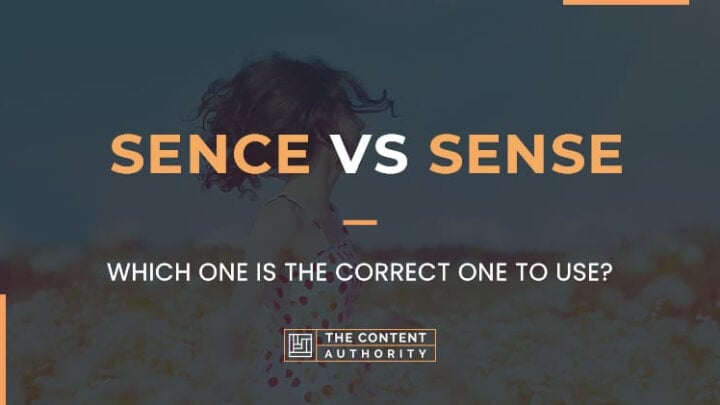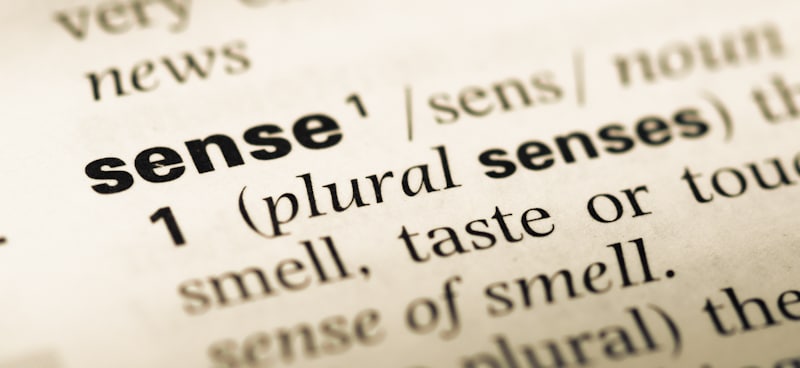Sometimes, when two words sound alike, it is easy to misspell them. In oral language, homophone words can go unnoticed. However, when writing these terms, it can get confusing to know which one to use. Which of them is the correct spelling between “sense” and “sence?”
The word “sense” is the correct spelling when referring to how we perceive external stimuli. The term “sence” does not exist and is a misspelling and archaic word for “sense.” “Sence” was also an alternative spelling of “since,” but it is considered slang.
Follow us to examine the origin and meaning of these two terms and how to use them in written language properly. In this article, we will also explain what homophones words refer to and the cause of the confusion when spelling these two terms.
What Does “Sense” Mean?
Sense As A Noun
As a noun, the Oxford Language dictionary defines “sense” as “a faculty by which the body perceives an external stimulus; one of the faculties of sight, smell, hearing, taste, and touch.” In the same way, we can say that “sense” is the ability to understand, recognize, value, or react to something. We can say that “sense” is what we use to perceive the outside world. For example:
- I have a very developed sense of hearing, making it easy for me to understand music.
- That man has a high sense of smell. He can identify ingredients in a meal only by smelling them.
- Dogs have a keen sense of smell.
- Taste is one of the five senses.
- Eagles have a highly developed sense of sight which allows them to spot their prey.
- Eagle eyesight is eight times more powerful than the average human’s.
- Birds do not have a strong sense of hearing.
- We don’t have to have an excellent sense of smell to tell if someone is a smoker.
- Covid-19 makes people lose their sense of smell or taste.
- When we are in danger, our senses are heightened so that we can take action.
- Scientists argue that cats’ have a high sense of direction.
- That guy acted like he was crazy. He lost his senses when finding out about her cheating wife.
Similar And Related Terms
- Sensation
- Perception
- Sight
- Hearing
- Touch
- Taste
- Smell
- Sixth sense
- Sensibility
Also, as a noun, “sense” describes “the characteristic of having good judgment, especially when it is based on practical ideas or understanding.” In other words, people can judge a situation or event reasonably based on socially accepted norms. Its origin is from late Middle English. For example:
- It doesn’t make sense to wear a coat during summer.
- They love each other, and they give each other a sense of security.
- Some people may say that love doesn’t make sense, but I think otherwise.
- Life makes sense to me when I’m playing my guitar.
- It makes no sense to assume something is true before investigating.
- How does life make sense? There are different opinions about it, but the best way is to do what you love and be yourself.
- As the saying goes, “common sense is not as common as you guess.”
- It makes no sense to use the term “sence” in a sentence.
- A mature person shows good sense when making decisions.
- The event brought her to her senses and made her change her lifestyle.
- It makes sense to think before speaking to avoid any further issues.
Sense As A Verb
As a verb, “sense” means “perceived by a sense or senses.” It is to experience something without being able to explain precisely how: It describes having a “gut feeling” about something. For example:
- Sometimes, I sense something terrible is going to happen.
- When something terrible happens, mothers can sense it and are never wrong.
- The speaker sensed the audience was bored, and he changed his speech.
- I sensed my brother was hiding something. So I pressed him to find out what it was.
- They were trying to deny it, but he could sense something was wrong.
- She continuously senses that someone is watching her when she walks in the street.
- He spoke with his boss because he sensed he was going to fire him.
- Automatic doors “sense” people’s presence and are opened.
- I sensed someone was behind me, but I was the only person in the room.
Similar And Related Terms
- Discern
- Feel
- Observe
- Notice
- Recognize
- Pick up
- Tell
- Distinguish
- Find
- Identify
- Comprehend
- See
- Apprehend
- Discover
- Learn
- Appreciate
- Realize
- Suspect
- Intuit
- Conceive
- Catch onto
History And Etymology
The verb “sense” dates from the mid 16th century. It comes from the Latin sensus “faculty of feeling, thought, meaning,” from sentire “feel.”
What Does “Sence” Mean?
The form “sence” is not a recognized word in a formal context. This word is a misspelling or an obsolete form of the word “sense,” usually used in an informal context, to replace the word “since.”
But What Are Homonyms?
The terms “sense” and “sence” are homonyms. Homonyms words are words that sound the same but have different meanings, and are spelled differently. Since they sound alike, it is easy for people to confuse their spelling when using them in written language.
In a broader sense, homonyms are words with similarities in the way we pronounce or spell them. You can classify them as homographs and homophones.
Homographs are words that are spelled the same way regardless of pronunciation but have different meanings. For example:
- Sow as a verb refers to planting a seed.
- Sow as a noun is a female pig.
- Bear is to support or carry something.
- Bear, as a noun, is an animal.
Homophones are words pronounced the same but have different meanings and may also be spelled differently. For example:
- Weather is the state of the atmosphere.
- The term “whether” is used to express a choice between alternatives.
The following examples illustrate other homophones words that we commonly confuse:
Then/than
“Then” is an adverb that describes an event that takes place after another.
- I went to the supermarket, and then I called a cab to pick me up.
“Than” is a preposition used to compare things.
- John is taller than his brother.
To/Too/two:
“To” is an adverb to indicate movement.
- He took his bike to a repair shop to have it cleaned.
“Too” is an adverb that means something is exaggerated, and we also use it to describe that something else happens in addition to another thing.
- The earrings are too expensive.
- Gloria needs new shoes too.
“Two” is a number
- I don’t understand why you need to have two phones.
By/Buy:
“By” is a preposition that identifies the person that acts.
- I was interrupted by the teacher.
“Buy” is a synonym for purchase.
- I’m looking to buy an apartment next year.
There is also another category known as pseudo-homophones within homophone words that can explain the confusion between “sense” and “sence”. When two homophones are considered pseudo-homophones, they sound the same, but one is not a recognized word or is an ancient form of the other term. In this case, the word “sence” is an obsolete way to spell “sense” and should not be used formally.
Conclusion
As mentioned above, “sense” and “sence” are homophone words that are considered pseudo-homophones. These pair words sound alike but have different spelling, and the word “sence” is not an actual word, but it is usually used in colloquial language referring to the preposition “since.” When you face this type of issue, we suggest investigating these similar words and identifying if they make sense within their context to ensure you are using the correct spelling.
Shawn Manaher is the founder and CEO of The Content Authority. He’s one part content manager, one part writing ninja organizer, and two parts leader of top content creators. You don’t even want to know what he calls pancakes.



